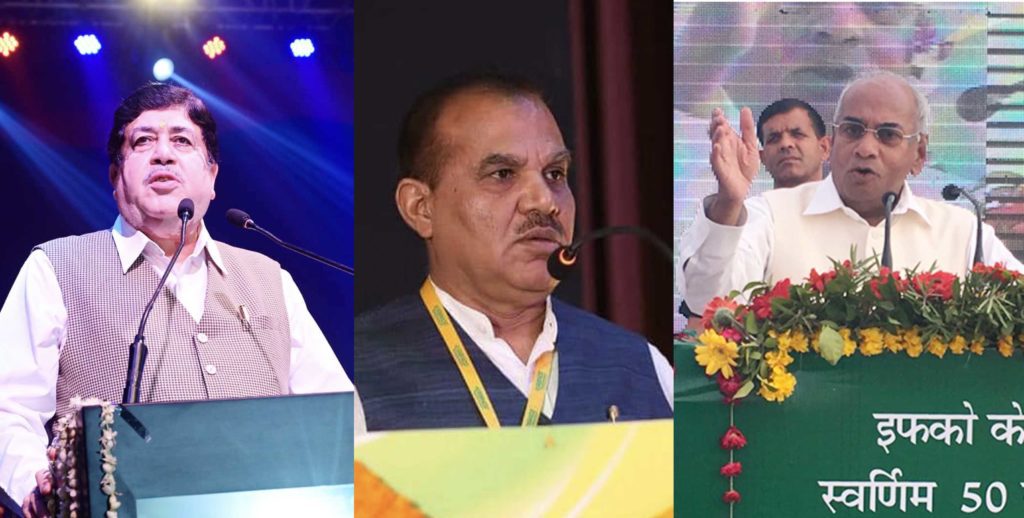Cooperatives engaged in the business of fertilizer production have welcomed the decision of the Cabinet Committee on Economic Affairs (CCEA) on the issue of extension of the Urea Subsidy Scheme for three years and earmarking Rs 3.68 lakh crore for this purpose. IFFCO Chairman Dileep Sanghani, MD Dr U S Awasthi and Kribhco Chairman Dr Chandra Pal Singh Yadav have lauded the govt for the farmer-centric move.
It bears recalling that in the Wednesday meeting of the CCEA, chaired by Prime Minister Narendra Modi, it was decided that the govt will continue with the Urea Subsidy Scheme to ensure constant availability of urea to farmers at the same price of Rs 242/ 45 kg bag excluding taxes and neam coating charges.
Out of the above approved package, Rs 3,68,676.7 Crore have been committed for urea subsidy for three years (2022-23 to 2024-25). This is apart from recently approved Nutrient Based Subsidy of Rs 38,000 Crore for Kharif season for 2023-24.
The govt release on the issue says that farmers need not spend extra for purchase of urea, and this will help moderate their input costs. At present, the MRP of urea is Rs.242 per 45 kg bag of urea (exclusive of charges towards neem coating and taxes as applicable), whereas the actual cost of the bag comes around Rs. 2200.
Welcoming the move, NCUI President and IFFCO Chairman Dileep Sanghani said the Modi government is committed to the progress of farmers. “Under the leadership of PM Shri Modi JI, the Government of India has extended the Urea Subsidy Scheme for 3years, the government has made a provision of Rs 3.68 lakh crore for this. Heartfelt thanks to @narendramodi ji”, tweeted Sanghani.
IFFCO MD Dr U S Awasthi, who is attending the ICA meeting in Brussels called the Cabinet decision a “Holistic Package for the promotion of Balanced Fertilisation & Alternative Fertiliser Usage”. In a release IFFCO said “It welcomes cabinet approval of Rs 3.68 lakh crore package of Urea subsidy, PM-PRANAM Yojana, Market Development Assistance (MDA) for organics and promotion of alternative and balanced fertilizer usage.”
“The Hon’ble Prime Minister has strengthened the hands of the farmers of the nation through this package which will also create a conducive environment for alternative fertilisers like Nano fertilisers and organic fertilisers”, concluded the release from the fertilizer co-operative.
Talking to the Indian Cooperative, Kribhco Chairman and ICA AP President Dr Chandra Pal Singh Yadav welcomed the govt move and said that with an assured supply of subsidized urea, farmers will have peace of mind and they can focus on farming without a worry.
Earlier, on Wednesday, the CCEA approved a unique package of innovative schemes for farmers with a total outlay of Rs.3,70,128.7 crore. The bouquet of schemes is focused at overall wellbeing and economic betterment of farmers by promoting sustainable agriculture. In its endeavour to safeguard farmers, Govt has increased Fertilizer subsidy from Rs. 73,067 Cr in 2014-15 to Rs. 2,54,799 Cr in 2022-23.
The govt release also says that by 2025-26, eight Nano urea plants with production capacity of 44 Crore bottles equalling 195 LMT of conventional urea will be commissioned. Nano fertilizer releases nutrients in a controlled manner contributing to higher nutrient use efficiency while costing less to the farmers.
Additionally, setting up and revival of 6 urea production units at Chambal Fertilizer- Kota Rajasthan, Matix ltd. Panagarh West Bengal, Ramagundam-Telangana, Gorakhpur-UP, Sindri-Jharkhand and Barauni-Bihar since 2018 is helping to make the country atma nirbhar in terms of urea production and availability.
Indigenous production of urea has increased from the level of 225 LMT during 2014-15, to 250 LMT during 2021-22. In 2022-23, production capacity has increased to 284 LMT. These along with Nano Urea Plants will reduce our current import dependency in urea and finally make us self-sufficient by 2025- 26.
